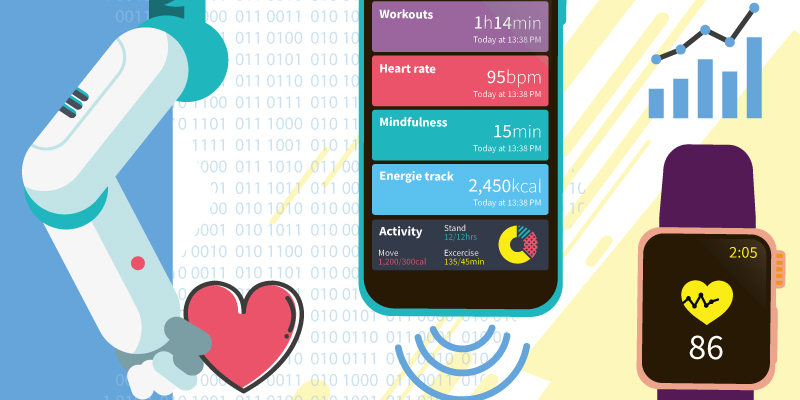The race toward health-tech has been starting to intensify over the last couple of years, and even more in the last several months. A string of announcements have showed how technology giants are escalating their efforts to hone in on this rapidly growing area of the market, which is expected to hit $509.2 billion by 2025, according to Grand View Research.
Just in the last couple of months, Google has acquired FitBit and information has come out about it’s controversial deal with the healthcare provider Ascension, which now gives Google access to millions of medical records across the United States. Meanwhile, Amazon has acquired the symptom-checking platform called Health Navigator and has also announced it’s Amazon pharmacy offer, while simultaneously, Apple has announced it’s first opt-in health research app to accumulate and compare valuable medical data from its users.

This major surge in activity comes at a time when trust in technology is, at best, wavering, and trust in honest healthcare providers and insurers are at a decline as well. It is a rapidly developing situation and the launch of a huge federal ‘antitrust investigation” into Google’s Ascension deal is only intensifying the debate. The extent to which these gigantic tech brands can progress in healthcare will depend on how much customers, health care practitioners and regulators feel they can trust those brands to access, use and store our most personal data, and the risks versus reward on newer tech.
On one hand, your personal data is a consumer’s most valuable asset. It requires a significant amount of trust and transparency for people to volunteer it willingly, as well as a clear understanding of what they’re getting in return, and it must also hold a deep value. On the other hand, these brands can make a potentially positive impact on our health and everyday lives. If they can demonstrate the tangible and genuine benefits their emerging health-tech offers can bring to the table, we could see a relaxation and even reconfiguration of what data people are willing to give up.
The added complexity is that not everyone cares about their personal data equally, or in the same ways. Certain things matter to certain people more than others and some people will give things freely more than others. This is actually a critical value exchange as it will show what consumers choose to keep, what they choose to give away, who they choose to give it to, and what they expect back in return, is going to be a big defining factor for the next stage of how the giant tech brands fare in the health-tech arena.
One ongoing question of trust in tech companies also offers a potential opportunity for existing healthcare brands and health-tech start-ups to win market share. While these companies do not have the mass appeal or global brand awards as tech brands, they are able to position themselves as trusted experts in their field in contrast with tech giants.
Some insurers are offering TeleMed services, or a way to have doctors appointments remotely using a cell phone or home computer. Another attraction to these potential challengers, such as AskMD and CarePassport, is that they offer people more control over managing their health by checking symptoms, finding practitioners and indexing health data all in one place, annexed away from data hungry tech giants.
As we have seen in the financial services categories, the health-tech outsiders that can find a specific niche to own that differs from what other tech brands offer, deliver a seamless and focused experience around their niche, seem to stand the greatest chance of success. Apps such as Glucose Buddy and Healthy Heart 2 are already popular with diabetics and people at risk of heart disease and are perfectly placed to develop, and sustain, meaningful relationships with consumers based on knowing a lot about a small niche subject.
What we know for sure is that this is a high stakes game, and with both the medical/healthcare world ever evolving, and technology evolving maybe even faster, the key is to building trust. You should never willingly give out personal data, through tech or otherwise, to a brand you do not know or trust, and to steer clear of any associated with media platforms like Facebook.
Some less daunting ways you can improve or utilize health-tech would be apps similar to the FitBit. If you do not own a FitBit, there are a plethora of free apps that do things like count your steps, keep track of meals or exercise, as well as well-woman apps to keep track of menstruation and birth control. Some even offer a reward or discount toward shopping purchases in return for your data and usage, however the data share policies or securities may not be as tight as some of the major tech brands so it’s very important to know what information you are comfortable sharing and read the terms before you utilize these health-tech tools.

Aside from convenience and use of use, technology as we know it only continues to advance medicine further, advancing the information our machines can output, to devices that stop heart issues or seizures in their tracks. Patient waiting times are declining and hospitals are more efficiently staffed thanks to artificial intelligence and predictive analytics. Even surgical procedures and recovery times are being reduced thanks to ultra-precise robots that assist in surgeries and make some procedures less evasive.
Here’s a comprehensive list on some of the ways Health-Tech can better our lives and wellness with advanced technology!
Administrative: Software tools and apps are making it so much easier for hospitals and medical staff to handle and organize administrative workloads, streamlining patient flows by calculating times to predict busy peak hours, as well as using the apps to ask patients preliminary questions and prioritizing schedules so doctors can use their time more efficiently.
Surgeries: Some of the biggest improvements we see in healthcare are surgeries. As you read this, robots are assisting with various operations, from minor non-invasive procedures to open heart surgery. These robotic assistants come in all shapes and sizes, ranging from a tiny bot that crawls the surface of the heart, to a giant arm that acts as an extra set of hands. Robots aren’t the only tech to invade the operating room, though. Virtual and augmented reality are helping doctors and surgeons perform tasks like practicing new surgical techniques to better explaining procedures to patients.
Drug Development: The Pharma industry is leaning on AI and machine learning to power a new wave of drug research and development. These tools are currently being used in a variety of aspects across the industry to help speed up time consuming tasks, like pinpointing chemical combinations that might help create the optimal drug and identifying patients who could best benefit from a particular drug.
Fitness: Fitness is obviously becoming a larger focus of the health tech ecosystem. The industry has developed hundreds of wearables, apps and other tools that do everything from track our workouts, meals and sleep schedules, all in the name of increasing fitness and reducing preventable costs on the healthcare system.
Diagnostics and Error Reduction: The healthcare industry is now using a variety of tech tools to tackle one of its major problems: incorrect or overdue diagnosis. By infusing tech into genetics, pathology and other important diagnostic fields, health-tech companies have helped detect deadly diseases like cancer, earlier and with greater accuracy than relying on humans alone.
Mental Health: Mental health is one of the emerging sectors of healthcare that is truly benefitting from an influx of technology. Virtual reality is seen as a bright light in the fight against depression, PTSD and even Alzheimers. Through exposure therapy, patients gradually train their brains to build immunity to past traumas until those thoughts no longer negatively affect them. Additionally, telemedicine apps have made access to counselors an healthcare professionals easier by opening the lines of communication and support, and reducing the need to wait for an in-person appointment during times of duress.
Remote Visits: Whether you are traveling, or live in a rural area and hate to make the drive, or possibly can’t make the drive due to illness or injury, health tech can provide you with a remote appointment via phone or video call with you doctor, not only making it super convenient for you to receive treatment, but it also allows you to remain in network if you are traveling, as the physician would be in network, at a remote location, saving you from astronomical bills of emergent can outside of network.
Prescriptions: If you are in need of prescription medication and are not covered by insurance or another drug plan, GoodRx and WellRx, along with some others, are resourceful and free tools anyone can use to discount their prescription medications. You can sign up in minutes from your smart phone right in the pharmacy, or at home from your computer, and you can use a screen captured image or printed image right away, versus waiting for a card to come in the mail.

(623) – 899- 7600
